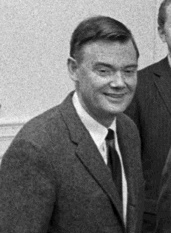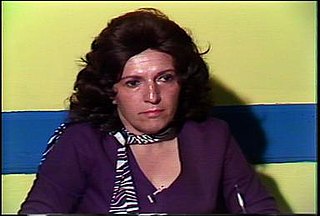Related Research Articles

Anna Louise Day Hicks was an American politician and lawyer from Boston,Massachusetts,best known for her staunch opposition to desegregation in Boston public schools,and especially to court-ordered busing,in the 1960s and 1970s. A longtime member of Boston's school board and city council,she served one term in the United States House of Representatives,succeeding Speaker of the House John W. McCormack.

Desegregation busing was a failed attempt to diversify the racial make-up of schools in the United States by sending students to school districts other than their own. While the 1954 U.S. Supreme Court landmark decision in Brown v. Board of Education declared racial segregation in public schools unconstitutional,many American schools continued to remain largely racially homogeneous. In an effort to address the ongoing de facto segregation in schools,the 1971 Supreme Court decision,Swann v. Charlotte-Mecklenburg Board of Education,ruled that the federal courts could use busing as a further integration tool to achieve racial balance.

John Anthony Volpe was an American businessman,diplomat,and politician from Massachusetts. A son of Italian immigrants,he founded and owned a large construction firm. Politically,he was a Republican in increasingly Democratic Massachusetts,serving as its 61st and 63rd Governor from 1961 to 1963 and 1965 to 1969,as the United States Secretary of Transportation from 1969 to 1973,and as the United States Ambassador to Italy from 1973 to 1977. As Secretary of Transportation,Volpe was an important figure in the development of the Interstate Highway System at the federal level.

John Frederick Collins was an American lawyer who served as the mayor of Boston from 1960 to 1968. Collins was a lawyer who served in the Massachusetts Legislature from 1947 to 1955. He and his children caught polio during a 1955 outbreak. He was reliant on a wheelchair and crutches the rest of his life. After partially recovering,he ran for mayor in 1959 as an underdog. He successfully portrayed himself as outside corrupt "machine politics" and was elected.

Kevin Hagan White was an American politician best known for serving as the mayor of Boston for four terms from 1968 to 1984. He was first elected to the office at the age of 38. He presided as mayor during racially turbulent years in the late 1960s and 1970s,and the start of desegregation of schools via court-ordered busing of school children in Boston. White won the mayoral office in the 1967 general election in a hard-fought campaign opposing the anti-busing and anti-desegregation Boston School Committee member Louise Day Hicks. Earlier he had been elected Massachusetts Secretary of the Commonwealth in 1960 at the age of 31,and he resigned from that office after his election as Mayor.

Harold Barefoot Sanders Jr. was an American attorney,politician,and jurist who served as a United States district judge of the United States District Court for the Northern District of Texas and counsel to President Lyndon B. Johnson. He was best known for overseeing the lawsuit to desegregate the Dallas Independent School District.
Morgan v. Hennigan was the case that defined the school busing controversy in Boston,Massachusetts during the 1970s. On March 14,1972,the Boston chapter of the NAACP filed a class action lawsuit against the Boston School Committee on behalf of 14 black parents and 44 children. Tallulah Morgan headed the list of plaintiffs,and James Hennigan,then chair of the School Committee,was listed as the main defendant.
Kathleen Sullivan Alioto is an American educator and politician who served on the Boston School Committee as a member (1974–79) and its president (1977). She played a role in the desegregation of the Boston public schools.

The Boston mayoral election of 1967 occurred on Tuesday,November 7,1967,between Secretary of the Commonwealth Kevin White and Boston School Committee member Louise Day Hicks. White was elected to his first term,and inaugurated on Monday,January 1,1968.
Thomas Irving Atkins was an American attorney and politician who served as a member of the Boston City Council and General Counsel of the NAACP.

Patrick F. McDonough was a Connemara,Ireland-born American police officer,attorney,and politician who served as a member of the Boston City Council from 1956–64,1966–70,and 1972–82. He was the Council President in 1958,1961,1973,and 1981.
The desegregation of Boston public schools (1974–1988) was a period in which the Boston Public Schools were under court control to desegregate through a system of busing students. The call for desegregation and the first years of its implementation led to a series of racial protests and riots that brought national attention,particularly from 1974 to 1976. In response to the Massachusetts legislature's enactment of the 1965 Racial Imbalance Act,which ordered the state's public schools to desegregate,W. Arthur Garrity Jr. of the United States District Court for the District of Massachusetts laid out a plan for compulsory busing of students between predominantly white and black areas of the city. The hard control of the desegregation plan lasted for over a decade. It influenced Boston politics and contributed to demographic shifts of Boston's school-age population,leading to a decline of public-school enrollment and white flight to the suburbs. Full control of the desegregation plan was transferred to the Boston School Committee in 1988;in 2013 the busing system was replaced by one with dramatically reduced busing.
John J. Kerrigan (1932-1996) was a member of the Boston School Committee from 1968 to 1975,and a member of the City Council from 1975 to 1977. He was one of the leading opponents of the plan to integrate the Boston Public School through busing.

Gerald F. "Gerry" O’Leary was an American politician from South Boston,Massachusetts.

Elvira "Pixie" Palladino was an American politician from Boston,Massachusetts,best known for her affiliation with Restore Our Alienated Rights (ROAR) and her opposition to court-ordered busing in the 1960s and 1970s. She was elected to the Boston School Committee several times in the 1970s,and served three two-year terms. Though she was cleared of bribery charges related to the Boston School Committee in 1981 this ultimately led to the loss of her Committee seat.
Boston City Council election was held on November 3,1981,with preliminary elections on September 21,1981. This election was the final one before the Council transitioned from having 9 members to having 13 members.
The Boston City Council election was held on November 8,1977,with preliminary elections on September 27,1977.
Paul J. Ellison was an American politician who served on the Boston School Committee from 1972 to 1976. In 1976,he was convicted of larceny for endorsing and cashing checks made out to his assistants.
William J. Foley Jr. was an American politician who served on the Boston City Council from 1952 to 1970.
Marion J. Fahey was an American educator who served as superintendent of the Boston Public Schools during the Boston desegregation busing crisis.
References
- ↑ "Boston School Committee Presidents" (PDF). bostonpublicschools.org. Archived from the original (PDF) on 25 March 2012. Retrieved 27 June 2011.
- ↑ Annual Report of the Election Department. Boston [Election Dept.] 1968. p. 46.
- ↑ Taylor, Steven J. L. (1998). Desegregation in Boston and Buffalo. Albany, New York: SUNY Press. p. 77. ISBN 9780791439197.
- ↑ "Boston School Official Is Cleared in Kickback". Associated Press. October 12, 1981. Retrieved 27 June 2011.